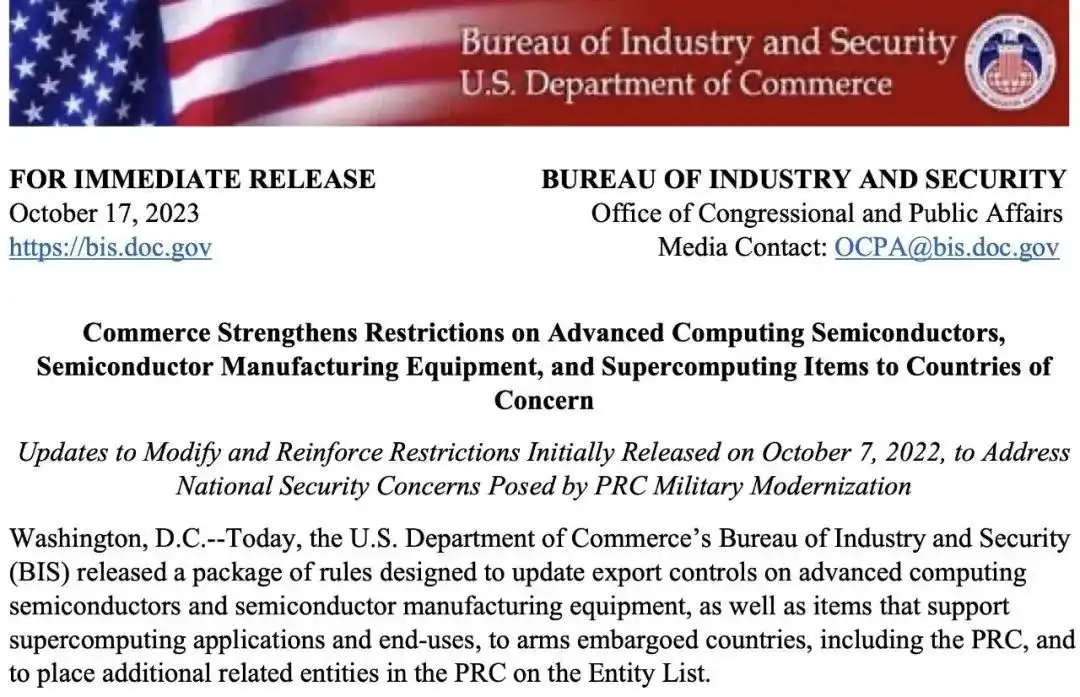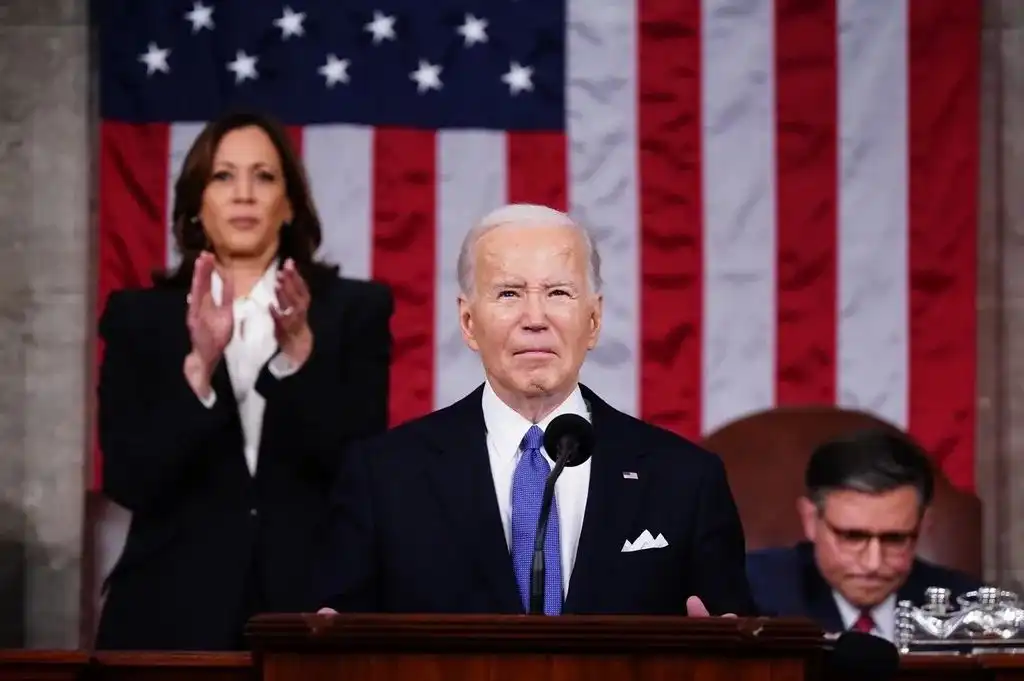The United States plays the card of "running out of skills" to increase chip sanctions on China
Recently, the United States has played the "chip card" against China again.
The U.S. Department of Commerce's Bureau of Industry and Security (BIS) issued a "Implementation of Additional Export Controls" announcement, further tightening exports of advanced chips and semiconductor manufacturing equipment to China.
In the past, the U.S. government has continuously upgraded export controls to China in semiconductors, AI chips and other fields.
From the release of the "Core Suppression" regulations in October 2022, to the update of the regulations in October 2023, and to this revision of the regulations, the United States has a more urgent mentality of "containing China with core", with greater intensity, and with faster pace.
It may seem menacing, but in fact黔驴技穷**。**
On October 7, 2022, the U.S. government issued the Interim Export Control Rules (IFR) for China's advanced computing chips, supercomputers and semiconductor manufacturing equipment, listing 31 Chinese companies and institutions on the "Unverified List"(UVL), strictly restricting U.S. companies and individuals exporting advanced chips to China.
On October 17, 2023, the U.S. government issued two new final rules and revised the Export Administration Regulations (EAR) to include nearly 800 Chinese companies and individuals in the "Entity List." (See also this article ["During Schumer's visit to China, see the entity list again, the United States 'red faces and white faces are once again in battle"]()
Export controls have been issued twice in a row. In addition to restricting high-end products such as NVIDIA, AMD, and Intel, even the game graphics card RTX4090 has been affected.
 2 023年 10月,美国发布 加强对华高科技产品出口管制 公告。
2 023年 10月,美国发布 加强对华高科技产品出口管制 公告。
The recent new regulations are to "patch up" last year. They may seem aggressive, but they are actually exhausted。
** On the surface, ** This revision refines the list of items and implementation regulations, and strengthens the identification and control of products involving so-called "national security".
** In fact, ** The United States, which can even restrict game graphics cards, has few trump cards left behind in chip sanctions against China. This revision is more reflected in the details, and it will be difficult to have "qualitative change" measures in the future.
If the United States forcibly carries out broader and deeper sanctions, it will be tantamount to breaking its arms, and its backlash will become an "unbearable burden" for the United States.
It seems to have a tough attitude, but it is actually full of guilt.
The United States frequently uses chips to suppress China. What is the "cause"?
"Election disease".
Both parties in the United States regard being tough on China as "politically correct" and regard打“中国牌”作为A political show worse than fierce fighting。
Recently, Trump has been clamoring for "imposing severe new restrictions" on China during the campaign, threatening to impose a 60% tariff on all Chinese goods after taking office.
Biden also hyped up "competing with China" in his State of the Union address. This new regulation is one of his actions to demonstrate his tough stance on China. (See also this article ["Come, I'll take you to eat the" melons "here]()
 3月8日,美 国总统拜登在国会发表国情咨文演讲 。
3月8日,美 国总统拜登在国会发表国情咨文演讲 。
"Sinophobia".
From electric vehicles to smart port lifting equipment, from TikTok to cross-border e-commerce apps, China's new technologies and products have made American politicians increasingly anxious.
US Commerce Secretary Raimondo once said at a press conference,"Technology is changing at an unprecedented rate, and we must wake up every day and ask ourselves,'Have we done enough?'"
At present, it should be "not enough", so American politicians can only pass不断Introduce new regulations to strengthen the "high walls of small courtyards" to "create peace of mind"。
Tyrannical hegemony and bullying are unjust, unreasonable and unprofitable.
Aggressive measures against the trend of "globalization" are for "injustice".
At present, the world economic recovery is weak. Major countries such as China and the United States should play an exemplary role, strengthen responsibility, and lead the international community to overcome difficulties together.
However, while China continues to inject momentum into the world economy with a more open attitude, the United States has embarked on "anti-globalization" measures for its own selfish interests and wantonly "uses the sickle of science and technology to harvest the world."
As everyone knows, many unrighteousness will kill itself, and the United States will eventually pay for its greedy behavior.
The hegemonic logic of depriving China of its legitimate development rights is "unreasonable".
China's scientific and technological progress and economic development rely on independence and self-reliance, opening up to the outside world, mutual benefit and win-win results, rather than plunder, aggression, and suppression of sanctions.
The United States often abuses the concept of "national security", raises trouble and crosses the border, wantonly curbs China's development, and traps and traps China everywhere. What it exposes is its "unreasonable" hegemonic thinking and zero-sum thinking.
Bullying behavior that prevents companies from expanding their profits is "unprofitable".
China is the world's largest semiconductor market, with chip sales accounting for about 1/3 of the global semiconductor market, creating a total of more than US$50 billion in annual revenue for US chip companies such as Nvidia, Intel and Qualcomm.
Through broad unilateral control, the United States will not only fail to achieve its generalized "national security", but will also harm the legitimate interests of U.S. companies and even the global semiconductor industry.
In recent years, affected by unilateral U.S. regulatory measures, Dutch lithography giant Asmer and American companies such as Intel and Qualcomm have experienced significant declines in revenue.
On April 4, Reuters quoted people familiar with the matter as saying that the Biden administration plans to put pressure on the Netherlands next week in an attempt to prevent Asmail from continuing to provide maintenance services for some tools and equipment to China. In other words, we must kill everyone.
阿斯麦尔 首席执行官彼得·温宁克多次反对美国施压,称“It is absolutely necessary to continue to gain market access to China ”。近日,荷兰首相吕特访华时也公开表示“会努力降低影响”。(另见本号文章 [ 《这国首相访华,能“交芯”吗?》 ]( )
 阿斯麦 尔 首席执行官 彼得·温宁克
阿斯麦 尔 首席执行官 彼得·温宁克
The United States 'technological suppression measures against China not only cannot "remove risks", but will instead create and aggravate risks.
4月2日,习近平主席同美国总统拜登通电话时表示, If the United States is willing to carry out mutually beneficial cooperation and share the dividends of China's development, China's door will always be open; if the United States insists on suppressing China's high-tech development and depriving China of its legitimate development rights, we will not sit idly by 。
Cooperation, China welcomes it! Competition, China faces it up! China is not afraid of confrontation!
